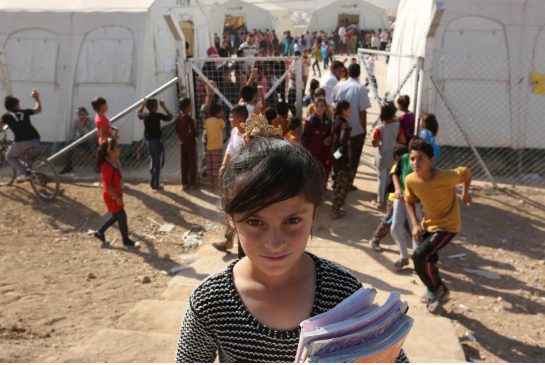Forgotten Yazidis face dire winter ahead
The traumatized Yazidi girls and women, and their relatives, are living in squalor, facing another harsh winter and dwindling hope.

STRINGER/IRAQ / REUTERS
A Yazidi refugee girl from the minority Yazidi sect poses for a photograph on the first day of school at Sharya refugee camp, on the outskirts of Duhok province, earlier this month.


In August 2014, the eyes of the world were fixed on Mount Sinjar, a sun-scorched mountain in northern Iraq, where thousands of Yazidis were besieged by Islamic State militants bent on killing, raping and enslaving them.
In the following months, horrifying stories emerged of women and girls who had managed to escape from IS. The militants boasted that rape and slavery were just punishments for “infidels” who belong to an ancient minority that does not fit their extreme definition of Islam.
A year later, the world’s focus has moved on to the Syrian refugee crisis that is overwhelming Europe’s borders.
But in Iraqi Kurdistan, as well as refugee camps in Turkey, the traumatized Yazidi girls and women, and their relatives, are living in squalor, facing a second harsh winter with dwindling hope — and without the basic food, shelter and sanitation they need to sustain them.
Some families are still marooned on Mount Sinjar, surviving on their remaining sheep and whatever they can grow.
When Prime minister-designate Justin Trudeau takes office next month, one of the first petitions on his desk will be from Yazidi advocates, pleading for Canada, Australia and the U.S. to open their doors to about 16,000 refugees they say have suffered “genocide” and urgently need asylum.
The plea follows a UN human rights report, which said that the atrocities committed by the jihadists may amount to genocide. And last month, advocacy groups Yazda and the Free Yezidi Foundation delivered a report to the International Criminal Court seeking recognition of the case as genocide.
An investigation into possible genocide was launched this month by three European researchers who have documented Nazi war crimes, backed by the French foreign ministry. They are interviewing witnesses to atrocities and victims of IS kidnappings.
Murad Ismael, a founder of Yazda, the U.S.-based global advocacy organization for Yazidis, says the mission is crucial to alert the world because more than 3,000 women and children remain captive, “subject to systematic rape on a daily basis.”
More than 80 per cent of the Yazidi population of northern Iraq is displaced and homeless in Kurdistan, and thousands more have fled the country in the hope of finding a safe haven. Some have died in the effort.
The Kurdistan Regional Government, which receives thousands of displaced Iraqi Sunnis and Syrians fleeing violence each week, says its capacity to support the millions now sheltering there is “exhausted.” The UN has received only 41 per cent of the $500 million needed for essential programs, and health programs and food vouchers have been cut.
“When I went to the (Yazidi) camp all I saw was helplessness,” says Ismael, who recently returned from Kurdistan. “People feel abandoned. The heat of summer and the storms have ruined their tents. Nobody is replacing them. One elderly woman in her 80s had a bed that was in the water.
“Many of the women who returned from captivity are in a desperate situation,” Ismael adds. “Very few organizations are giving them support. They don’t even have food or clothes — they can’t buy socks for the winter.”
Yazda has set up a primary medical care centre in northern Iraq that serves 500 displaced people a day, many former kidnap victims or survivors of slaughter from the attack on Mount Sinjar. But, Ismael says, even with a largely volunteer medical staff, “we don’t have the $9,000 (US) a month we need to keep it going.”
Yazidis living outside the camps, in unfinished buildings and construction sites, are among the worst off, with no access to aid, as the harsh mountain winter approaches and temperatures can drop to 0C.
In Turkey the situation is little better, says Ismael. And for those desperate enough to flee to war-devastated Syria, living conditions are “dire.”
In Turkey, refugee camps are in Kurdish areas that may be caught in the crossfire between Turkish troops and Kurdish militants, and one, housing about 4,000 Yazidis, is now occupied by Turkish soldiers planning attacks against Kurdish PKK militants.
Unless the Yazidis can be resettled in safe countries, the outlook is grim, Ismael says.
“Canada should open its doors to the victims of genocide. And it should help those who are still in Iraq and hope to return to their destroyed homes one day. It’s not just the women who escaped IS who need help, but the widows and children without parents.
“Thousands of men were executed, and mothers are left alone, with no support, to care for their children. They and their children see no future ahead of them.”
Top News
- Updated Cancer risk from processed meat ranks with smoking, says WHO
- Updated Women’s College researcher 'manipulated' study results
- TTC 'too full' to attract expected ridership growth
- Bautista's bat flip could breach TPP copyright changes: critics
- John Baird addresses Tory leadership rumours
- All five dead in B.C. whale-watching boat capsize are Britons
- The rise of Ben Carson, a Republican more outrageous than Trump
- The Animal Scam: Star Touch exclusive

